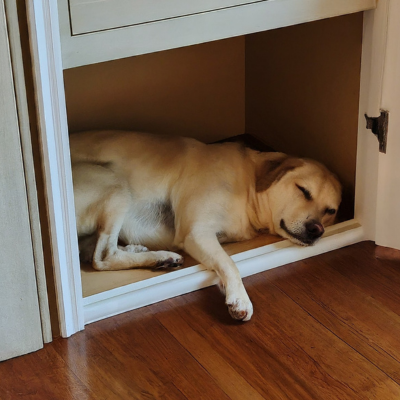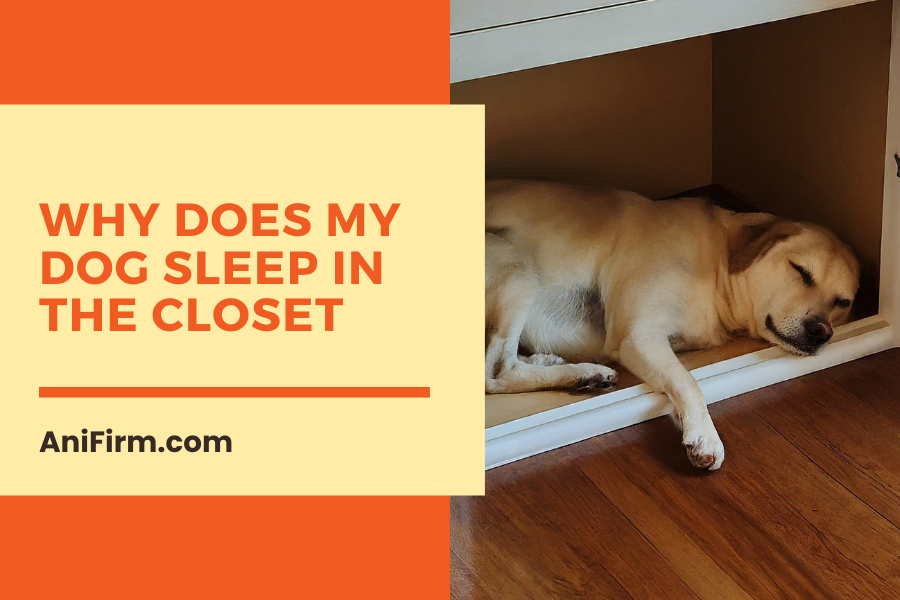Your dog’s behavior tells you a lot about them. Some dogs are calm and sensitive, while others are playful and energetic. But regardless of their personality, your dog might choose to hide in small spaces like your closet. This is normal for dogs because small spaces make them feel safe and content.
Sometimes, dogs hide because they’re scared of loud noises, storms, strangers, or bad experiences they had before. They might also be feeling anxious or sad, especially if they’re sick or hurt. If your dog seems depressed and doesn’t want to eat or come out, it’s important to take them to the vet to make sure they’re okay. Closets can be a safe place for dogs when they’re scared or in pain, but it’s best to help them get better so they can be happy and healthy again.

15 Reasons Why Dogs Prefer Sleeping in the Closet?
1. It helps them feel safer
Dogs seek out small, enclosed spaces like closets because it provides them with a sense of security and protection.
2. Closet feels comfortable to them
The softness of clothes or blankets in the closet can provide a comfortable surface for dogs to sleep on.
3. They have more familiarity with the closet
Dogs often prefer familiar environments, and if they’ve slept in the closet before, they may continue to do so out of habit and comfort.
4. They like the temperature in there
Closets tend to be warmer than other areas of the house, which can be appealing to dogs, especially during colder months.
5. Closet avoids noise disturbance
The enclosed space of a closet can provide dogs with a quiet retreat away from loud noises or disturbances.
6. They want to sleep alone
Some dogs prefer to have their own space for sleeping and may choose the closet for its privacy.
7. Fear of something
Dogs may sleep in the closet if they’re scared or anxious about something happening in their environment.
8. Due to Injury or illness
Dogs experiencing pain or discomfort due to injury or illness may seek out the closet for rest and recuperation.
9. Protection from pests
Dogs may hide in the closet to avoid pests or insects that bother them elsewhere in the house.
10. Lack of alternative sleeping options
If a dog doesn’t have access to a comfortable bed or designated sleeping area, they may choose the closet as a makeshift sleeping spot.
11. Your dog is Pregnant
Pregnant dogs may seek out the closet as a safe and quiet space to give birth and care for their puppies.
12. Your dog is getting old
Senior dogs may find comfort in the quiet and warmth of the closet as they age and require more rest.
13. Separation from other pets
Dogs may retreat to the closet to have some time alone and separate themselves from other pets in the household.
14. Sense of Ownership
Dogs might think of the closet as their special place. They feel like it’s their own territory where they feel happy and safe.
15. Protection from Light
Some dogs don’t like too much light when they sleep. The darkness of the closet can help them sleep better because it’s more soothing and calming for them.
How Can I Stop My Dog From Sleeping in the Closet?
If you want to stop your dog from sleeping in the closet, here are some steps you can take:
- Keep the closet door shut so your dog can’t go inside.
- Block the entrance to the closet with a baby gate or barrier so your dog can’t get in.
- Train your dog to sleep in a certain place, like a crate or dog bed, using treats and praise.
- Reward your dog with treats and attention when they sleep in the right spot, and ignore them when they try to sleep in the closet.
- Put calming scents, like lavender, in the sleeping area to help your dog feel relaxed.
- Keep your dog entertained with toys and games to distract them from wanting to sleep in the closet.
- Give your dog a soft bed or blanket to sleep on in their designated spot.
- Make sure your dog gets plenty of exercise and playtime so they’re tired and more likely to sleep in their bed.
- Play soothing sounds to help your dog relax and sleep in their designated area.
- If your dog keeps sleeping in the closet, ask a vet for advice.
Should I Let My Dog Sleep and Stay in the Closet?
Whether or not you should let your dog sleep in the closet depends on several factors and the potential risks and benefits involved. Here’s a breakdown to help you decide:
Potential Benefits
- Comfort and Security: If your dog seems genuinely comfortable and secure in the closet, and it’s not causing any harm, it might be okay to let them sleep there.
- Quiet Space: If your dog prefers a quiet environment for sleep and the closet doesn’t disrupt them or others, it might be a suitable option.
- Temperature Control: If the closet offers a preferred temperature compared to other areas, and it’s safe and well-ventilated, it might be acceptable.
Potential Risks
- Health Issues: Hiding can be a sign of pain or illness. Rule out any medical concerns with your vet before assuming the closet is their sole preference.
- Fear and Anxiety: Hiding can also indicate fear or anxiety. Address the underlying cause with a vet if this seems likely.
- Safety Hazards: Closets can contain dangers like chemicals, loose wires, or falling objects. Ensure it’s a safe, well-ventilated environment.
- Limited Socialization: If your dog spends excessive time isolated in the closet, it can hinder their social development and interaction with the family.
- Accidents and Waste: Confined spaces might increase the risk of accidents or difficulty accessing necessities like water or a designated bathroom area.
Considerations:
- Observe your dog closely: Monitor their overall behavior, sleeping patterns, and any signs of discomfort or anxiety.
- Consult your veterinarian: Rule out any potential health concerns that might be motivating their preference for the closet.
- Address underlying issues: If fear, anxiety, or illness seem like factors, seek professional help from a vet.
- Create a comfortable alternative: Provide a designated, inviting bed in a quiet area of the house as a more accessible option.
- Ensure their basic needs are met: Make sure they have easy access to food, water, bathroom facilities, and exercise outside the closet.
- Gradually discourage closet use: If other areas are suitable, gently encourage your dog to use their new bed with positive reinforcement and make the closet less appealing by removing familiar items.
Ultimately, the decision depends on your dog, their needs, and the safety of their environment. Prioritize their health, well-being, and social interaction while ensuring their sleeping space is safe and comfortable. If you have any concerns, consult your veterinarian or a qualified animal behaviorist for personalized advice.
